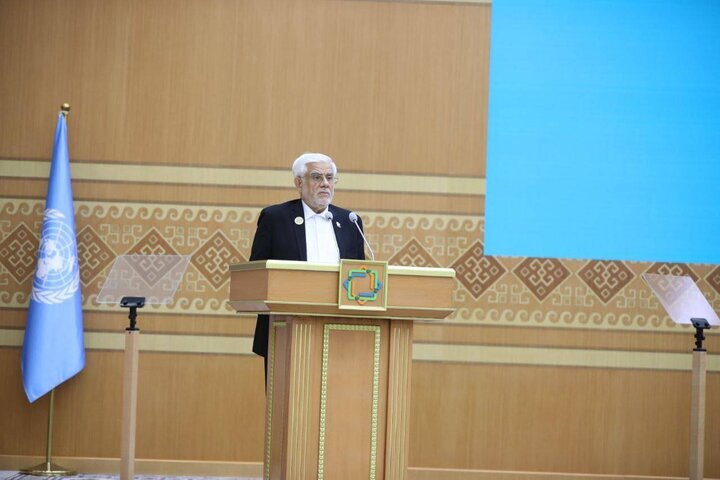‘Tomorrow will be too late’, Iran VP urges swift collective effort to break Gaza siege

TEHRAN – Iran’s First Vice President, Mohammad Reza Aref, has issued a stark warning about the humanitarian crisis in Gaza, warning: “Tomorrow will be too late.”
He made the remarks at the Third UN Conference on Landlocked Developing Countries in Turkmenistan on Tuesday, calling for immediate and collective international action to lift the blockade.
“For nearly two years, the people of Gaza have suffered unimaginable crimes. The weaponization of starvation and thirst has failed to break their spirit.”
He urged the global community and human rights advocates to take responsibility and end the suffering before it escalates further.
Aref strongly condemned the systematic war crimes by the Zionist regime in the besieged territory, stating:
“Attacking starving civilians in search of food, water, or medicine is a blatant war crime and crime against humanity. The international community — especially those who claim to champion human rights — must be held accountable for the blood spilled in Gaza.”
Aref also sharply criticized the 12-day military assault on Iran by Israel — supported by the United States — which he said claimed 1,100 lives, including 45 children and 132 women, and wounded 5,750 others.
“With its support for the Zionist regime — and even direct involvement in attacks on Iran’s peaceful nuclear facilities — the United States has destroyed the negotiation table and once again confirmed global mistrust in its promises,” he said.
He underscored that Iran has never initiated war but will defend its sovereignty and pursue legal compensation for damages inflicted by Israeli and American assaults.
While noting that a new round of Iran-U.S. talks had been planned, Aref stated that U.S. complicity in the Israeli strike effectively killed prospects for diplomacy.
“Iran will seek justice through international legal mechanisms for the human and material toll imposed by this unlawful aggression.”
‘Iran’s importance as a regional logistics and transit hub is growing’
Aref emphasized Iran’s growing importance as a regional logistics and transit hub, especially for landlocked countries. He noted that eight LLDCs — Afghanistan, Armenia, Azerbaijan, Kazakhstan, Kyrgyzstan, Tajikistan, Turkmenistan, and Uzbekistan — rely on Iran’s direct or multilateral transit routes.
“Iran plays a vital role in connecting Asia, Africa, and Europe,” Aref said, emphasizing that this infrastructure is open to both domestic and foreign investment.
He credited recent digitization, customs cooperation, and trade facilitation reforms with helping Iran hit a record 20 million tons in cargo transit in 2024, thanks largely to regional partnerships. Iran, he added, is drafting roadmaps for deeper transit collaboration with LLDCs.
Aref praised Turkmenistan’s policy of neutrality and emphasized its partnership with Iran in fostering regional peace and sustainable development.
Iran, with its access to the Persian Gulf, Sea of Oman, and Indian Ocean, and Turkmenistan, as a gateway to Central Asia and the Caucasus, form a natural transit bridge for LLDCs. He pointed to ports like Chabahar and Bandar Abbas, which serve as global market access points for regional states.
He also highlighted Iran’s active participation in multilateral mechanisms like the Economic Cooperation Organization (ECO), the Ashgabat Agreement, the Eurasian Economic Union, and the Shanghai Cooperation Organization.
“Our approach to regional connectivity is based on cooperation, not competition — in line with the spirit of the Vienna and Avaza Programs of Action.”
Aref arrived Monday evening at Turkmenbashi International Airport, where he was received by Turkmenistan’s Vice President.
The LLDCs conference officially opened Tuesday with speeches from Turkmen President Serdar Berdimuhamedov and UN Secretary-General Guterres.
‘Iran’s nuclear activities are compliant with international law’
In talks with Guterres on the sidelines of the conference, Aref reiterated that Iran’s nuclear activities are peaceful and compliant with international law, asserting that the U.S. and Israel’s recent attack violated all legal norms.
“Iran accepted a ceasefire for humanitarian reasons, despite continued threats,” Aref said.
Guterres condemned the Israeli-American strike as a violation of international law and stressed the UN’s commitment to peace, diplomacy, and humanitarian relief in Gaza.
‘Iranian firms ready to participate in Armenian development projects’
In another meeting with President of the Republic of Armenia Vahagn Khachaturyan, Aref reaffirmed Iran’s special relationship with Armenia, emphasizing opportunities for expanded cooperation in energy, agriculture, technology, education, and infrastructure.
He also welcomed Armenia’s potential membership in the Shanghai Cooperation Organization, and hailed the Iran-EAEU free trade deal as a platform to boost trade.
“Iranian firms with expertise in dam construction and AI are ready to participate in Armenian development projects,” Aref said.
President Khachaturyan expressed strong support for Iran and looked forward to President Pezeshkian’s upcoming visit to Yerevan, calling it a “golden opportunity” to deepen bilateral ties.
‘Iran rejects foreign interference in Libya’s political process’
In a separate meeting with Libya’s Presidential Council Head, Mohammad al-Menfi, Aref voiced Iran’s backing for a "Libyan-led" political process, rejecting any foreign interference. He emphasized Iran’s readiness to share technology, knowledge, and experience with Libya, especially given both nations’ struggles under sanctions.
He proposed reviving the Iran-Libya joint commission and noted progress in reopening Iran’s embassy in Tripoli.
Al-Menfi thanked Iran for its support and echoed Aref’s condemnation of Israel’s aggression.
“We support Iran’s right to energy self-sufficiency and stand with the people of Gaza,” he said.
Leave a Comment